The effects of climate change and globalization on mosquito vectors: evidence from Jeju Island, South Korea on the potential for Asian tiger mosquito (Aedes albopictus) influxes and survival from Vietnam rather than Japan
- PMID: 23894312
- PMCID: PMC3722226
- DOI: 10.1371/journal.pone.0068512
The effects of climate change and globalization on mosquito vectors: evidence from Jeju Island, South Korea on the potential for Asian tiger mosquito (Aedes albopictus) influxes and survival from Vietnam rather than Japan
Abstract
Background: Climate change affects the survival and transmission of arthropod vectors as well as the development rates of vector-borne pathogens. Increased international travel is also an important factor in the spread of vector-borne diseases (VBDs) such as dengue, West Nile, yellow fever, chikungunya, and malaria. Dengue is the most important vector-borne viral disease. An estimated 2.5 billion people are at risk of infection in the world and there are approximately 50 million dengue infections and an estimated 500,000 individuals are hospitalized with dengue haemorrhagic fever annually. The Asian tiger mosquito (Aedes albopictus) is one of the vectors of dengue virus, and populations already exist on Jeju Island, South Korea. Currently, colder winter temperatures kill off Asian tiger mosquito populations and there is no evidence of the mosquitos being vectors for the dengue virus in this location. However, dengue virus-bearing mosquito vectors can inflow to Jeju Island from endemic area such as Vietnam by increased international travel, and this mosquito vector's survival during colder winter months will likely occur due to the effects of climate change.
Methods and results: In this section, we show the geographical distribution of medically important mosquito vectors such as Ae. albopictus, a vector of both dengue and chikungunya viruses; Culex pipiens, a vector of West Nile virus; and Anopheles sinensis, a vector of Plasmodium vivax, within Jeju Island, South Korea. We found a significant association between the mean temperature, amount of precipitation, and density of mosquitoes. The phylogenetic analyses show that an Ae. albopictus, collected in southern area of Jeju Island, was identical to specimens found in Ho Chi Minh, Vietnam, and not Nagasaki, Japan.
Conclusion: Our results suggest that mosquito vectors or virus-bearing vectors can transmit from epidemic regions of Southeast Asia to Jeju Island and can survive during colder winter months. Therefore, Jeju Island is no longer safe from vector borne diseases (VBDs) due to the effects of globalization and climate change, and we should immediately monitor regional climate change to identify newly emerging VBDs.
Conflict of interest statement
Figures

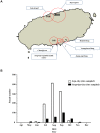
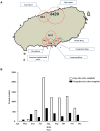
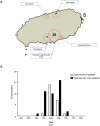
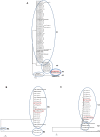
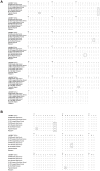

Similar articles
-
Aedes (Stegomyia) aegypti in the continental United States: a vector at the cool margin of its geographic range.J Med Entomol. 2013 May;50(3):467-78. doi: 10.1603/me12245. J Med Entomol. 2013. PMID: 23802440
-
[Aedes albopictus, vector of chikungunya and dengue viruses in Reunion Island: biology and control].Parasite. 2008 Mar;15(1):3-13. doi: 10.1051/parasite/2008151003. Parasite. 2008. PMID: 18416242 Review. French.
-
Host-feeding patterns of native Culex pipiens and invasive Aedes albopictus mosquitoes (Diptera: Culicidae) in urban zones from Barcelona, Spain.J Med Entomol. 2011 Jul;48(4):956-60. doi: 10.1603/me11016. J Med Entomol. 2011. PMID: 21845962
-
Present and future projections of habitat suitability of the Asian tiger mosquito, a vector of viral pathogens, from global climate simulation.Philos Trans R Soc Lond B Biol Sci. 2015 Apr 5;370(1665):20130554. doi: 10.1098/rstb.2013.0554. Philos Trans R Soc Lond B Biol Sci. 2015. PMID: 25688015 Free PMC article.
-
Dengue and chikungunya: long-distance spread and outbreaks in naïve areas.Pathog Glob Health. 2014 Dec;108(8):349-55. doi: 10.1179/2047773214Y.0000000163. Epub 2014 Dec 9. Pathog Glob Health. 2014. PMID: 25491436 Free PMC article. Review.
Cited by
-
Host Preferences and Impact of Climate on Blood Feeding in Anopheles funestus Group from South Africa.Trop Med Infect Dis. 2024 Oct 21;9(10):251. doi: 10.3390/tropicalmed9100251. Trop Med Infect Dis. 2024. PMID: 39453278 Free PMC article.
-
Genetic Diversity of Dengue Vector Aedes albopictus Collected from South Korea, Japan, and Laos.Insects. 2023 Mar 20;14(3):297. doi: 10.3390/insects14030297. Insects. 2023. PMID: 36975982 Free PMC article.
-
Genetic Diversity of Dengue Virus in Clinical Specimens from Bangkok, Thailand, during 2018-2020: Co-Circulation of All Four Serotypes with Multiple Genotypes and/or Clades.Trop Med Infect Dis. 2021 Sep 4;6(3):162. doi: 10.3390/tropicalmed6030162. Trop Med Infect Dis. 2021. PMID: 34564546 Free PMC article.
-
Global dengue fever management in health systems: identifying strategies, challenges and solutions - a scoping review protocol.BMJ Open. 2025 Apr 25;15(4):e097085. doi: 10.1136/bmjopen-2024-097085. BMJ Open. 2025. PMID: 40280619 Free PMC article.
-
List of occupational diseases among farmers in Korea: a literature review.Ann Occup Environ Med. 2025 Feb;37:e2. doi: 10.35371/aoem.2025.37.e2. Epub 2025 Feb 19. Ann Occup Environ Med. 2025. PMID: 39967337 Free PMC article. Review.
References
-
- Shuman EK (2010) Global Climate Change and Infectious Diseases. N Engl J Med 362: 1061–1063. - PubMed
-
- IPCC 4th (2007) Chapter 8 Human Health 8.2.8 Vector-borne, rodent-borne and other infectious diseases 403–405.
-
- Health Effects of Climate Change in the UK (2012) 8 Effects of climate change on vector-borne diseases 159–199.
-
- Jeju Regional Meteorological Administration website. (2012) Available: http://web.kma.go.kr/aboutkma/intro/jeju/index. Accessed 2012 Jun 1.
Publication types
MeSH terms
LinkOut - more resources
Full Text Sources
Other Literature Sources
Medical

